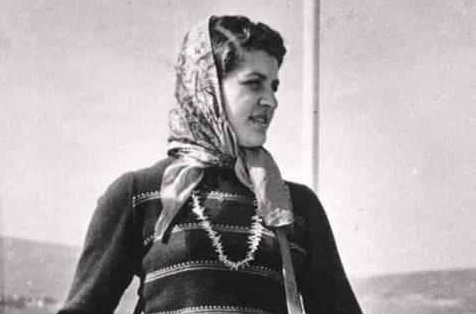
Moheba Khorsheed (1921-2000) was from the coastal Palestinian city of Yafa (also known as Jaffa), which was home to one of the major ports in Palestine. She was a teacher, a political activist, and an armed fighter who defended her city against Zionist militias.
After the ethnic cleansing of Yafa, during which over 50,000 Palestinians out of a population of 70,000 were forcibly displaced from their homes and driven to the sea, Khorsheed settled in Egypt and married, leading the rest of her life as a refugee, never allowed to return.
What did she do?
Moheba Khorsheed studied in Jerusalem at the Higher Institute for Teachers. After gaining her diploma, she moved back to her hometown Yafa and taught high school girls, instilling in them the spirit of nationalism.
Prior to the 1948 Palestine War, Yafa was one of the most advanced and thriving cities in Palestine. It was home to the majority of newspapers and print publications, and was known for its development in various industries such as agriculture, factories, banking and fishing.
Khorsheed continued studying Arabic literature and journalism. She was part of a women’s society called the Arab Ladies Association where she made sure that there was equal representation of all religious backgrounds amongst the members. As tensions and fights between Palestinian and Zionist paramilitaries rose in 1947, she established another women’s society called Zahrat al-Uqhawan, or the Chrysanthemum Flowers. This society was in charge of collecting funds to buy weapons and providing relief to Palestinian families who were already displaced.
The Chrysanthemum Flowers transformed into an all-women armed organization after Khorsheed witnessed a British sniper shoot a ten year old Palestinian boy in the head who died in his mother’s arms. She played a leading role and was involved in organizing and implementing operations, strategizing and gathering guns for use. Zionist propaganda denounced and incited against her, whereas the Arab media praised her and compared her to Khawla Bint al-Azwar, a revered and legendary woman from the early history of Islam who fought many battles disguised as a man.
What were her ideas?
Moheba Khorsheed was an outspoken figure who publicly advocated for the education of women and encouraged them to shun detrimental traditions aside. This was combined with her patriotic fervor and opposition to Zionist colonies built on Palestinian land, displacing the indigenous population. Some villages and towns, such as Qibya and Deir Yassin, were subjected to horrifying massacres and total demolition.
Religious toleration played a huge role in her activism, as she stressed equal treatment and acceptance of people regardless of their differences in beliefs. Khorsheed struck up a brief friendship with Rachel Dayan, the niece of Moshe Dayan, a leader in the Zionist militia group Haganah which committed many atrocities against Palestinians, and who later become Israel’s Chief of Staff. Rachel condemned Zionism and its extremism, and spent three days at Khorsheed’s house recuperating after she sustained a nasty gash on her leg as a result of climbing the wired fence that separated her home in the Jewish colony of Bat Yam from Yafa. Rachel had come to warn Khorsheed of the preparation of the Zionist militias to override Yafa. It was the last time they would see each other.
Moheeba Khorsheed was known for her rousing public speeches at demonstrations, which led the colonial power at the time – the British Mandate in collusion with the Zionist movement – to summon her for interrogation. Khorsheed managed to evade interrogation by feigning sickness, even getting a doctor to issue fake medical reports on her behalf. Her sister Arabiya, who had co-established the Flowers with her, took Khorsheed’s place in protests and delivered her speeches instead.
What is her legacy?
After Yafa fell, Moheeba Khorsheed was one of the thousands of refugees who were literally driven to the sea. She finally settled in Egypt after making her way to Lebanon and then Jordan, where she married and returned to teaching. She never returned to her hometiwn, and died in 2000.
A learned woman, Khorsheed understood the necessity of taking direct action to defend one’s community and homeland against colonial forces, which is testament to her rounded personality as someone who was dedicated to working in the interests of her students and assisting the impoverished around her.
An educator, an activist and an armed fighter, Moheba Khursheed is credited with founding the first official armed women organization against colonialism in Palestine. Women had a rich history of participating in nationalistic struggles, such as selling their jewellery to buy weapons for the men in their family or gathering intelligence and relaying them back to the fighters, but the Chrysanthemum Flowers was the first established group of its kind.